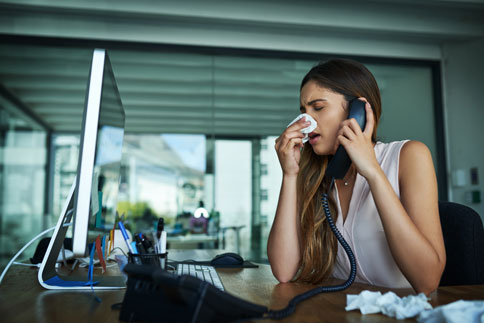Prevention is the Best Strategy for Fighting Influenza
The best way to avoid getting influenza is to get vaccinated. We recommend vaccination for everyone age six months and older. It’s particularly important in certain populations who are more at risk such as:
- Children younger than 5
- Pregnant women
- People older than 65
- People with underlying autoimmune diseases such as asthma and other chronic lung issues
The vaccine takes about two weeks to develop immunity. We know that the most common time for flu season is end of October through spring — with the peak being January-February. So, when possible, plan on getting your vaccination by the end of October.
In addition to vaccinations, other precautions to take:
Clean surfaces you touch frequently
In the common areas at work, use disinfecting wipes on elevator buttons, doorknobs, handles, faucets, tables and copiers/printers.
Clean your desk area at the beginning of your day. Wipe off your keyboard, mouse, telephone, pens and the surface of your desk. And don’t forget your cellphone!
At home, regularly clean:
- Dish sponges
- Kitchen sink
- Toothbrush holder
- Pet bowl and pet toys
- Coffee reservoir
- Bathroom faucet handles
- Countertops
- Stove knobs and dishwasher buttons
- Light switches
- Toilet handle
- Toilet seat
- Doorknobs
- Light switches
- Cellphone
- Keyboard
- Remote controls
- Hand towels
- Shower curtain
- Indoor garbage cans
Wash your hands
Cleanse often with soap and water or with an alcohol-based hand sanitizer when soap and water are not available. Keep hand sanitizer at your desk.
Maintain healthy habits
Get plenty of rest, physical activity and eat healthy.
If you get influenza, please don’t share. Distance yourself from others so you don’t help spread the virus.
Stay home from work if you have:
- Fever
- Headache
- Extreme tiredness
- Cough
- Sore throat
- Runny or stuffy nose
- Muscle aches
- Nausea, vomiting and diarrhea
Cover your nose and mouth with a tissue when you cough or sneeze. If you don’t have a tissue, cough or sneeze into your elbow. Flu and other serious respiratory illnesses such as respiratory syncytial virus (RSV) and whooping cough are spread by coughing, sneezing and unclean hands.
When should you wash your hands?
- Before, during, and after preparing food
- Before eating food
- Before and after caring for someone who is sick
- Before and after treating a cut or wound
- After using the toilet
- After changing diapers or cleaning up a child who has used the toilet
- After blowing your nose, coughing, or sneezing
- After touching an animal, animal feed or animal waste
- After handling pet food or pet treats
- After touching garbage
How should you wash your hands?
- Wet your hands with clean, running water (warm or cold), turn off the tap and apply soap.
- Lather your hands by rubbing them together with the soap. Be sure to lather the backs of your hands, between your fingers and under your nails.
- Scrub your hands for at least 20 seconds. Need a timer? Hum the “Happy Birthday” song from beginning to end twice.
- Rinse your hands well under clean, running water.
- Dry your hands using a clean towel or air dry them.
